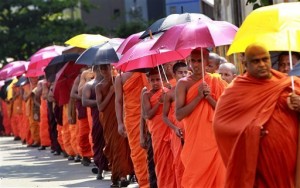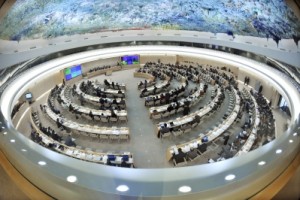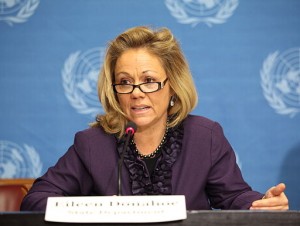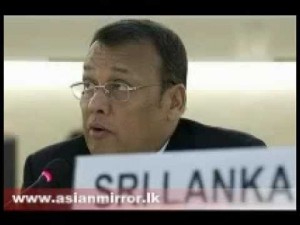If Sri Lanka wins in Geneva LLRC may not be implemented
“If Sri Lanka succeeds in defeating the US-sponsored resolution there will be a renewal of government confidence in its policies of governance. It will mean that the government will continue to assert that national security and economic development constitute the pillars of national reconciliation. It may be for these reasons that the government has not yet implemented the interim recommendations of the LLRC which were made over a year ago. These unimplemented recommendations include the disarming of paramilitary groups and providing information to families of those in detention regarding their whereabouts. Even the national anthem continues to be sung in the Sinhala language only in opposition to the LLRC recommendation that it be sung in both Sinhala and Tamil at national functions. In this context, it is difficult to imagine any comprehensive implementation of the LLRC recommendations in the event of a Sri Lankan victory in Geneva.”
The unfolding tragedy in Geneva
The presentation of the US-sponsored resolution on Sri Lanka at the ongoing session of the UN Human Rights Council appears inevitable. The Sri Lankan people have

Buddhist monks, supporters of the government, march towards the U.S. Embassy, to urge the United States to withdraw its support for a proposed U.N. Human Rights Council resolution on alleged abuses during the country's civil war, in Colombo, Sri Lanka, Wednesday, March 14, 2012
every reason to be bemused. They lived through nearly three decades of terror and war where they saw successive governments battling it out with the LTTE, not only on the military battlefields of the North and East of the country, but also in various international forums. Now with the LTTE eliminated, they would have reasonably expected to enjoy the fruits of peace and international solidarity with those countries that had once banned the LTTE as a terrorist organization. Instead they find the present Sri Lankan government on the defensive internationally, battling the very countries that had banned the LTTE in international forums. Ironically, at the centre of the dispute is the report of the Lessons Learnt and Reconciliation Commission, which was intended to bring about national reconciliation and not add to further polarization.
Impunity and broken promises
Most Sri Lankan people do not see the present moves in Geneva as being in relation to international criticism at the way the war with the LTTE ended and the impunity and broken promises that have accompanied post-war govenance. They find it difficult to understand why the international community is targeting the government for ending the menace of the LTTE which engaged in greater atrocities in the course of the war. The government has taken the position that those who support the US sponsored resolution are against Sri Lanka and for the destruction of the national leadership that defeated the LTTE. It has not been difficult for the government to portray the Tamil Diaspora and NGOs that are supportive of the US-sponsored resolution as being driven by antipathy towards the government. As a result, along with the government leadership, most Sri Lankans believe that the purpose of the US-sponsored resolution is to punish the government for militarily defeating the LTTE.
Public disaffection
However, at the same time, the majority of people also have other major problems to worry about. There is growing public disaffection at the government’s apparent lack of concern for the people’s welfare as against the enrichment and accumulation of power for its own members. Despite the government’s focus on the developments in Geneva, and the media publicity on these matters, major sections of the Sri Lankan work force have been going on strike seeking their own economic survival in a harsh economic environment in which it seems that the rich who are connected to the ruling party get richer while the poor get poorer. This explains why the vociferous public
protests against the US-sponsored resolution in front of Western embassies have an appearance of government orchestration. In responding to the developments in Geneva, the government needs to pay heed to the fact that the general public’s continued support cannot be based on nationalism alone.
Odds against
The Sri Lankan government has been engaged in a near total mobilization of its resources to defeat the US-sponsored resolution. This includes sending a large delegation of diplomats, politicians, media personnel and NGO leaders to canvass on its behalf. They make a powerful combination that presents the government position on the need for more time and space for internal processes of reconciliation to take root without external intervention. Unfortunately, the government’s failure to implement even the interim recommendations of the Lessons Learnt and Reconciliation Commission it appointed two years ago, and which forms the centre piece of the US-sponsored resolution, has weakened the sincerity of their case. Internal processes of reconciliation continue to be marginal in the face of the continued militarization of life in the country, especially in the former war zones of the North and East. On the other hand, from an international perspective, the much stronger case that the Sri Lankan government has is the argument that flows from the need to uphold national sovereignty against the selective application of international standards.
Russian and China
Sri Lanka has already received strong support from countries such as Russia and China which consistently uphold the principle of non-interference in the internal affairs of sovereign countries. In addition, it has picked up important support from Japan, which has urged a more patient and cautious approach rather than imposing

The Human Rights Council Sessions in Geneva commenced. Representatives of member countries are now participating in the meeting.The 19th Sessions of the UN Human Rights Council Sessions commenced on February 27, 2012. Representatives of 47 member countries are attending the sessions. The Sessions will continue until the 27th of March.
externally designed solutions upon Sri Lanka. Although it is facing internal opposition for its pro-Sri Lanka stance, India too has take a supportive position towards its neighbour, stating that it does not support country-specific resolutions. Due to the supportive stances of these major world powers, Sri Lanka still retains the possibility of emerging triumphant when the vote is taken in Geneva.
In the event of a Sri Lankan victory in Geneva – hard to imagine LLRC implementation
If Sri Lanka succeeds in defeating the US-sponsored resolution there will be a renewal of government confidence in its policies of governance. It will mean that the government will continue to assert that national security and economic development constitute the pillars of national reconciliation. It may be for these reasons that the government has not yet implemented the interim recommendations of the LLRC which were made over a year ago. These unimplemented recommendations include the disarming of paramilitary groups and providing information to families of those in detention regarding their whereabouts. Even the national anthem continues to be sung in the Sinhala language only in opposition to the LLRC recommendation that it be sung in both Sinhala and Tamil at national functions. In this context, it is difficult to imagine any comprehensive implementation of the LLRC recommendations in the event of a Sri Lankan victory in Geneva.
Continuing rancour
The other alternative and more likely scenario is the passage of the US-sponsored resolution. The Sri Lankan media has reported that over a hundred US diplomats are canvassing the case against Sri Lanka, making a relatively small country into a central issue in global politics. The odds are high that the US will prevail given its diplomatic and economic clout with many of the countries that are voting members of the UN Human Rights Council. The bitterness and rancor that has accompanied the debate in Geneva is unlikely to evaporate within the Sri Lankan government or its supporters at the conclusion of the vote. The setting up of an international monitoring and advisory mechanism as advocated in the US-sponsored resolution, even to implement the LLRC recommendations, is likely to be contested every step of the way within Sri Lanka.
In the event the Resolution is passed
In the event that the US-sponsored resolution is passed in Geneva, the most likely scenario is a repeat of what happened with the Independent International Group of Eminent Persons (IIGEP) appointed in 2007 to accompany the investigations of the Presidential Commission of Inquiry into Serious Human Rights Violations. Initially
there was an appearance of cooperation between these two bodies. But the relationship soon deteriorated. The advice and technical expertise of the international experts was not appreciated in many aspects by their local counterparts. There were disagreements about legal interpretation and the procedures to be followed. Eventually the international experts ended their mission prematurely and departed in circumstances clouded by hostility and misunderstanding.
Similar confrontation to IIGEP
A similar confrontational situation is quite likely to arise in the aftermath of an international intervention into Sri Lanka brought about by the US-sponsored resolution in Geneva. But the stakes will be higher this time. Unlike in the case of the IIGEP, the international experts will be backed by a mandate of the UN Human Rights Council obtained through a vote. The sanctions against Sri Lanka for not cooperating with a mechanism set up by the UN system can be greater than anticipated. There will be no relief for the vast majority of Sri Lankans of all ethnicities who are hoping for a peace dividend that will translate into improved opportunities for the livelihoods. It would be tragic if Sri Lanka should end up as a test case for UN sanctions rather than as a model of post-war reconciliation, as envisaged by the LLRC. Even countries that are not supporting the US-sponsored resolution have urged that the LLRC recommendations be implemented. This is where the government has failed up to now, and must resolve to correct itself whatever the outcome of the vote.


